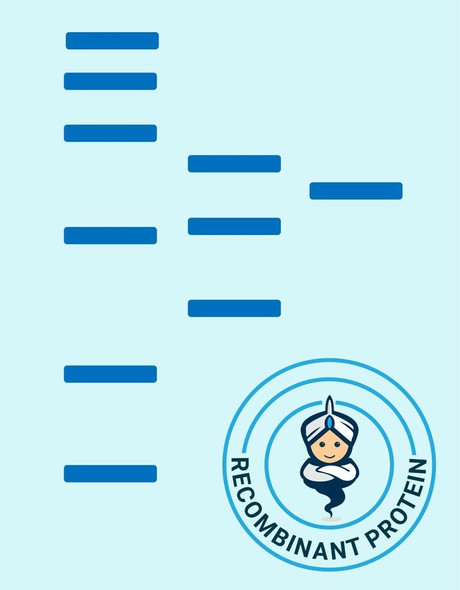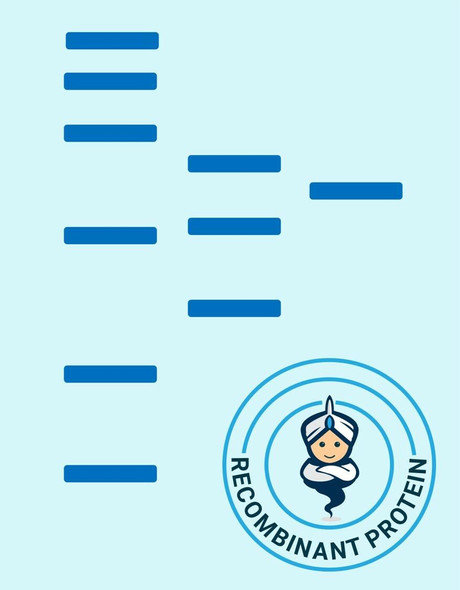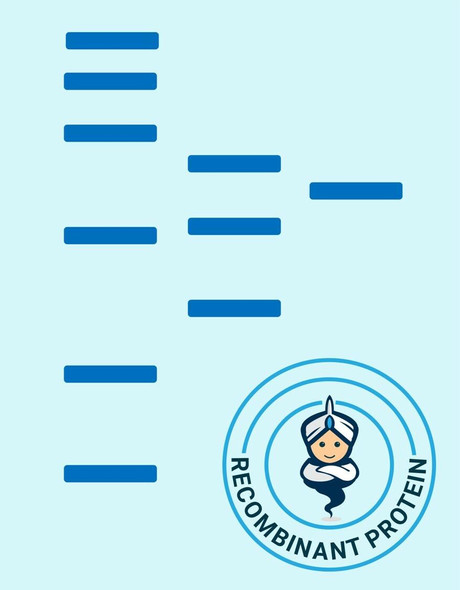Human CFB (260-764) Recombinant Protein (RPPB3157)
- SKU:
- RPPB3157
- Product type:
- Recombinant Protein
- Size:
- 10ug
- Species:
- Human
- Target:
- CFB (260-764)
- Synonyms:
- CFB
- C3/C5 convertase
- Glycine-rich beta glycoprotein
- GBG
- Source:
- Sf9 Insect cells
- Uniprot:
- P00751
Description
| Product Name: | Human CFB (260-764) Recombinant Protein |
| Product Code: | RPPB3157 |
| Size: | 10µg |
| Species: | Human |
| Target: | CFB (260-764) |
| Synonyms: | CFB, C3/C5 convertase, Glycine-rich beta glycoprotein, GBG, PBF2, Properdin factor B, BF, BFD, AHUS4, ARMD14, CFAB, CFBD, FB, FBI12, GBG, H2-Bf. |
| Source: | Sf9 Insect cells |
| Physical Appearance: | Sterile Filtered colorless solution. |
| Formulation: | CFB protein solution (0.5mg/ml) containing Phosphate Buffered Saline (pH 7.4) and 20% glycerol. |
| Stability: | Store at 4°C if entire vial will be used within 2-4 weeks. Store, frozen at -20°C for longer periods of time. For long term storage it is recommended to add a carrier protein (0.1% HSA or BSA).Avoid multiple freeze-thaw cycles. |
| Purity: | Greater than 90.0% as determined by SDS-PAGE. |
| Amino Acid Sequence: | ADPKIVLDPS GSMNIYLVLD GSDSIGASNF TGAKKCLVNL IEKVASYGVK PRYGLVTYATYPKIWVKVSE ADSSNADWVT KQLNEINYED HKLKSGTNTK KALQAVYSMM SWPDDVPPEGWNRTRHVIIL MTDGLHNMGG DPITVIDEIR DLLYIGKDRK NPREDYLDVY VFGVGPLVNQVNINALASKK DNEQHVFKVK DMENLEDVFY QMIDESQSLS LCGMVWEHRK GTDYHKQPWQAKISVIRPSK GHESCMGAVV SEYFVLTAAH CFTVDDKEHS IKVSVGGEKR DLEIEVVLFHPNYNINGKKE AGIPEFYDYD VALIKLKNKL KYGQTIRPIC LPCTEGTTRA LRLPPTTTCQQQKEELLPAQ DIKALFVSEE EKKLTRKEVY IKNGDKKGSC ERDAQYAPGY DKVKDISEVVTPRFLCTGGV SPYADPNTCR GDSGGPLIVH KRSRFIQVGV ISWGVVDVCK NQKRQKQVPA HARDFHINLF QVLPWLKEKL QDEDLGFLHH HHHH |
Factor B is a protein, build from a single chain that circulates in the blood. Complement factor D cleaves and activates factor B, thus creating a catalytic subunit Bb and noncatalytic chain Ba. Subunit Bb is a serine protease that can bind to C3b and forms alternative pathway C3 convertase. Subunit Ba acts as an inhibitor for proliferation of lymphocytes, when Bb is part of the lymphocytes’ proliferation. The gene that codes for this protein is located on chromosome six.
CFB Human Recombinant produced in Sf9 Baculovirus cells is a single, glycosylated polypeptide chain containing 514 amino acids (260-764 a.a) and having a molecular mass of 58.1kDa.CFB is fused to an 9 amino acid His-tag at C-terminus & purified by proprietary chromatographic techniques.
| UniProt Protein Function: | CFB: Factor B which is part of the alternate pathway of the complement system is cleaved by factor D into 2 fragments: Ba and Bb. Bb, a serine protease, then combines with complement factor 3b to generate the C3 or C5 convertase. It has also been implicated in proliferation and differentiation of preactivated B- lymphocytes, rapid spreading of peripheral blood monocytes, stimulation of lymphocyte blastogenesis and lysis of erythrocytes. Ba inhibits the proliferation of preactivated B-lymphocytes. Defects in CFB are a cause of susceptibility to hemolytic uremic syndrome atypical type 4 (AHUS4). An atypical form of hemolytic uremic syndrome. It is a complex genetic disease characterized by microangiopathic hemolytic anemia, thrombocytopenia, renal failure and absence of episodes of enterocolitis and diarrhea. In contrast to typical hemolytic uremic syndrome, atypical forms have a poorer prognosis, with higher death rates and frequent progression to end-stage renal disease. Susceptibility to the development of atypical hemolytic uremic syndrome can be conferred by mutations in various components of or regulatory factors in the complement cascade system. Other genes may play a role in modifying the phenotype. Belongs to the peptidase S1 family. 2 isoforms of the human protein are produced by alternative splicing. |
| UniProt Protein Details: | Protein type:Protease; Secreted, signal peptide; EC 3.4.21.47; Secreted Chromosomal Location of Human Ortholog: 6p21.3 Cellular Component: extracellular region; extracellular space; plasma membrane Molecular Function:complement binding; serine-type endopeptidase activity Biological Process: complement activation; complement activation, alternative pathway; regulation of complement activation Disease: Complement Factor B Deficiency; Hemolytic Uremic Syndrome, Atypical, Susceptibility To, 4; Macular Degeneration, Age-related, 14 |
| NCBI Summary: | This gene encodes complement factor B, a component of the alternative pathway of complement activation. Factor B circulates in the blood as a single chain polypeptide. Upon activation of the alternative pathway, it is cleaved by complement factor D yielding the noncatalytic chain Ba and the catalytic subunit Bb. The active subunit Bb is a serine protease which associates with C3b to form the alternative pathway C3 convertase. Bb is involved in the proliferation of preactivated B lymphocytes, while Ba inhibits their proliferation. This gene localizes to the major histocompatibility complex (MHC) class III region on chromosome 6. This cluster includes several genes involved in regulation of the immune reaction. Polymorphisms in this gene are associated with a reduced risk of age-related macular degeneration. The polyadenylation site of this gene is 421 bp from the 5' end of the gene for complement component 2. [provided by RefSeq, Jul 2008] |
| UniProt Code: | P00751 |
| NCBI GenInfo Identifier: | 584908 |
| NCBI Gene ID: | 629 |
| NCBI Accession: | P00751.2 |
| UniProt Secondary Accession: | P00751,O15006, Q29944, Q53F89, Q5JP67, Q5ST50, Q96HX6 Q9BTF5, Q9BX92, B0QZQ6, |
| UniProt Related Accession: | P00751 |
| Molecular Weight: | 68,872 Da |
| NCBI Full Name: | Complement factor B |
| NCBI Synonym Full Names: | complement factor B |
| NCBI Official Symbol: | CFB |
| NCBI Official Synonym Symbols: | BF; FB; BFD; GBG; CFAB; CFBD; PBF2; AHUS4; FBI12; H2-Bf; ARMD14 |
| NCBI Protein Information: | complement factor B |
| UniProt Protein Name: | Complement factor B |
| UniProt Synonym Protein Names: | C3/C5 convertase; Glycine-rich beta glycoprotein; GBG |
| Protein Family: | Complement factor |
| UniProt Gene Name: | CFB |
| UniProt Entry Name: | CFAB_HUMAN |










